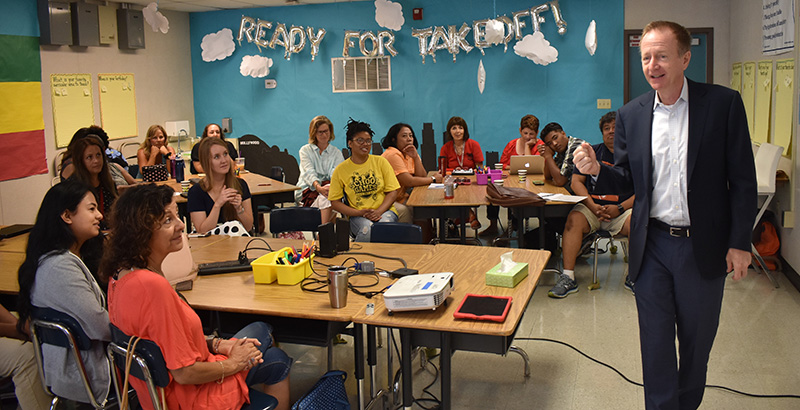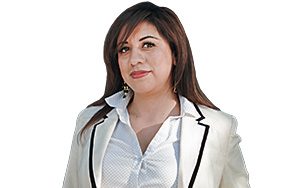Fewer Emails, More Power: L.A.’s New Schools Chief Lays Out Back-to-School Vision for District Leaders

Los Angeles, California
The new superintendent of the country’s second-largest school district offered fresh proof that he intends to break away from district tradition in his back-to-school address.
Gone was the big screen with the elaborate PowerPoint presentation or video showing the district’s accomplishments and data. There were no department head speeches, no announcements of a strategic plan or particular campaign or goals. Five of the six Los Angeles Unified school board members were in attendance, but this time they were seated with the rest of the audience and not onstage.
There was just Austin Beutner, former investment banker–turned–schools chief, onstage in advance of L.A.’s schools reopening for the 2018-19 school year, committing to reducing bureaucracy and to letting school leaders lead their classrooms without having to “ask for permission.”
“All great schools start with a good leader, and I’ve never met a leader who asked for permission to lead,” he said. The administrators and principals seemed unsure whether to break into applause, and some laughed nervously trying to understand what they were hearing, as most of them are used to the centralized district’s culture where decisions are made at the top — at “Beaudry,” where district headquarters is located.
“The answers are in your classroom, in your schools. We at Beaudry don’t have all the answers. Do what works for your schools,” Beutner said. “This chapter will be built on simplicity and focus, not on quick fixes and new programs. We need to build on the things that are working and change the things that are not.”
Beutner offered a long list of reasons change was needed in the 600,000-student district. Among them:
● Of every 100 students who enter L.A. Unified high schools, 12 will drop out.
● Of every 100 students, 77 will graduate from high school.
● Of every 100 high school graduates, only 12 will graduate from college.
● Less than 60 percent of L.A. Unified’s graduates are eligible for a public four-year college.
● Not all students have access to great schools and so are not on a path to college or a 21st century career.
● If nothing changes, about $450 million of the district’s $700 million reserves will be spent to cover the deficit by the 2019-20 school year.
● Only half of L.A. Unified’s high schools offer both high-level calculus and physics.
● Only 1 in 10 students take high-level, AP STEM courses, and of those students, only 1 in 4 females will achieve a college-going score.
● Of the nearly 63,000 students in gifted programs, only 3,300 — or about 5 percent — are African-American.
● L.A. Unified has almost 70,000 students with an Individualized Education Program (IEP); about 7,000 students are severely disabled. The rest — 63,000 students — can learn on grade level, yet nearly 50 percent are segregated from their peers for much, if not most, of the day.
● Less than 2 percent of students with an IEP who are in segregated settings are proficient in reading or math.
Beutner also offered some specific ways he intends to alter L.A. Unified’s culture, starting with the 300 or so emails totaling thousands of pages that the average principal receives each month from the central office.
“We’re going to cut that in half by simplifying communications and communicating only what matters,” he said. “Starting Monday, school leaders will receive a comprehensive, biweekly email from their director.”
Also starting this week, parents will be getting recorded messages by phone from sports celebrities from L.A. teams, such as the Lakers and Clippers, encouraging them and their students to be in school every day.
In addition to cutting back on the amount of time school leaders spend on managing bureaucracy and compliance, Beutner wants to increase community and family engagement, he said, from students, parents, teachers, and school leaders; civic and grassroots organizations; the business, labor, and philanthropic sectors; faith-based groups; and city, county, and state elected leaders.
“Public education is the common ground on which we all stand,” he said.
Beutner also announced in a statement that the district will develop a plan to provide more resources to schools and improve student learning by moving decision-making from the central bureaucracy directly to schools.
L.A. Unified will hire two firms to help in the initiative: the consulting group Ernst & Young and Kitamba, an education organization that designs strategies to produce learning improvements for students.
Several board of education members in the audience expressed support for Beutner’s philosophy.
“We can do better, and I agree with everything he [Beutner] said,” board member Richard Vladovic said. “We’re going to move forward, and I don’t want any more going back. I believe the kids can do it if we expect them to. I’m excited!”
For the first time in at least two decades, the pre-back-to-school event also featured a celebrity guest speaker. L.A. Clippers head coach Doc Rivers delivered a short motivational speech especially for the school principals Beutner is trying to empower.
“You’re trying to inspire a group of kids to dream and believe, but there’s no guarantees for them, and you still have to inspire them every day. I’m trying to inspire guys that make millions of dollars,” Rivers said. “You can win every day by inspiring someone to be successful. That’s the world championship for you.”
Get stories like these delivered straight to your inbox. Sign up for The 74 Newsletter

;)
